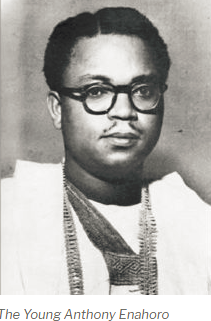Anthony Enahoro | |
|---|---|
 | |
| Personal details | |
| Born | 22 July 1923 Uromi, Western Region, British Nigeria (now Uromi, Edo State, Nigeria) |
| Died | 15 December 2010 (aged 87) Benin City, Nigeria |
| Political party | Movement for National Reformation |
| Spouse | Helen |
| Relations | Peter Enahoro (brother) |
| Children | Kenneth, Eugene, Bella, Victor and Gabriel Enahoro. |
| Profession | Politician |
Chief Anthony Eromosele Enahoro CFR (22 July 1923 – 15 December 2010[1]) was one of Nigeria's foremost anti-colonial and pro-democracy activists.[2]
He was born the eldest of ten children in Uromi, present-day Edo State of Nigeria. His Esan parents were Anastasius Okotako Enahoro (1900–1968) and Fidelia Victoria Inibokun née Ogbidi Okojie (1906–1969).[3] Enahoro had a long and distinguished career in the press, politics, civil service and the pro-democracy movement. Educated at the Government School, Uromi, Government School, Owo and King's College, Lagos.[4]
Enahoro became the editor of Nnamdi Azikiwe's newspaper, the Southern Nigerian Defender, Ibadan, in 1944 at the age of 21, thus becoming Nigeria's youngest editor ever.[5] He later became the editor of Zik's Comet, Kano, 1945–49, associate editor of West African Pilot, Lagos, and editor-in-chief of Morning Star from 1950 to 1953.[6]
In 1953, Enahoro became the first to move the motion for Nigeria's independence which was eventually granted in 1960, after several political setbacks and defeats in the parliament.[7] Enahoro has been regarded by academics and many Nigerians, as the "Father of Nigeria State".[2]
His initial motion for Nigeria's Independence suffered a setback in the parliament, with the northern members of the parliament staging a walkout as a consequence of the motion.[8] Notwithstanding the defeat in the parliament, a popular movement was started on account of this motion and the pressure was now mounted against colonialism and there were agitations for independence of Nigeria, or at least, self-governance. S. L. Akintola attempted to revisit the motion for Nigeria's independence in 1957 and though his motion was passed by the parliament, it was not acquiesced to by the British colonial authorities and it therefore failed.[9]
In August 1958, Remi Fani-Kayode revisited Enahoro's motion and the motion was again passed by the parliament but its date was not approved by the British. Fani-Kayode's motion had called for independence to be granted to Nigeria on 2 April 1960. In furtherance of Enahoro's original motion, a further motion was proposed to the parliament by Sir Abubakar Tafawa Balewa in 1959, and it was passed. [citation needed] As a consequence of the sustained pressure, the colonial governor announced the decision of the British government to grant independence in 1960. Nigeria was granted independence on 1 October 1960.[10]
- ^ Asika-Enahoro, Maureen (2018-12-15). "Remembering Anthony Eronsele Enahoro: Adolor of Uromi, Okaku"o of Edoland". The Guardian. Retrieved 2024-09-18.
- ^ a b Muoka, Chidera (2017-10-01). "Five Independence Day Heroes". The Guardian. Retrieved 2024-09-18.
- ^ "Biography – Anthony Enahoro Foundation". Retrieved 2024-07-04.
- ^ Adesulu, Dayo (2016-09-29). "Nigeria at 56: What Education was like before independence". Vanguard. Retrieved 2024-09-18.
- ^ "Chief Anthony Enahoro speaks!". Sahara Reporters. 2006-01-01. Retrieved 2021-07-10.
- ^ "Enahoro:Tribute to a statesman". Vanguard. 2010-12-26. Retrieved 2021-07-10.
- ^ "Resting places of some Nigeria's independence heroes". The Punch. 2020-10-03. Retrieved 2021-07-10.
- ^ "Anthony Enahoro, A Journalist Who Moved Motion For Nigeria's Independence In 1953". Nigerian Tracker. 2021-02-25. Retrieved 2024-07-04.
- ^ "Who Moved The Motion For Nigeria's Independence, By Fani-Kayode". Premium Times. 2013-05-02. Retrieved 2021-07-10.
- ^ "Nigeria - Independent Nigeria". Britannica. Retrieved 2023-01-29.